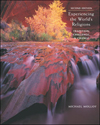| apocalypticism
|
The belief that the world will soon come to an end; this belief usually includes the notion of a great battle, final judgment, and the reward of the good.
|
 |
 |
 |
| apostle
|
One of Jesus' twelve disciples; also any early preacher of Christianity.
|
 |
 |
 |
| baptism
|
The Christian rite of initiation, involving immersion in water of sprinkling of water.
|
 |
 |
 |
| Bible
|
The scriptures sacred to Christians, consisting of the books of Hebrew bible and the New Testament.
|
 |
 |
 |
| bishop
|
'Overseer' (Greek); a priest and church leader who is in charge of a large geographical area called a diocese.
|
 |
 |
 |
| canon
|
'Measure,' 'rule' (Greek); a list of authoritative books of documents.
|
 |
 |
 |
| ecumenism
|
Dialogue between Christian denominations.
|
 |
 |
 |
| Eucharist
|
'Good Gift' (Greek); the Lord's Supper.
|
 |
 |
 |
| evangelical
|
Emphasizing the authority of the scripture; an adjective used to identify certain Protestant groups.
|
 |
 |
 |
| evangelist
|
'Good news person' (Greek); one of the four 'authors' of the Gospels-Matthew, Mark, Luke and John.
|
 |
 |
 |
| filioque
|
'And from the Son'; a Latin work added to the creeds in the Western Church to state that the Holy Spirit arises from both the Father and the Son. This notion helped cause a separation between Western and Eastern Churches.
|
 |
 |
 |
| gospel
|
'Good news' (Middle English); an account of the life of Jesus.
|
 |
 |
 |
| icon
|
'Image' (Greek); religious painting on wood, as used in the Orthodox Church.
|
 |
 |
 |
| incarnation
|
'In flesh' (Latin); a belief that God became visible in Jesus.
|
 |
 |
 |
| indulgence
|
'Kindness-toward' (Latin); remission of time spent in purgatory (a state of temporary punishment in the afterlife); an aspect of Catholic belief and practice.
|
 |
 |
 |
| Lent
|
'Lengthening day,' 'spring' (Anglo-Saxon); the preparatory period before Easter, lasting forty days.
|
 |
 |
 |
| Messiah
|
'Anointed' (Hebrew); a special messenger sent by God foretold in Hebrew scriptures, and believed by Christians to be Jesus.
|
 |
 |
 |
| Mormons
|
A group who consider themselves to be Christians who belong to a perfect, restored Christianity. A branch of the Church of Jesus Christ of Latter-Day saints.
|
 |
 |
 |
| original sin
|
An inclination toward evil, inherited by human beings as a result of Adam's disobedience.
|
 |
 |
 |
| orthodox
|
'straight opinion' (Greek); correct belief.
|
 |
 |
 |
| Orthodoxy
|
The Eastern branch of Christianity.
|
 |
 |
 |
| patriarch
|
The bishop of one of the major ancient sites of Christianity (Jerusalem, Rome, Alexandria, Antioch, Constantinople, and Moscow.
|
 |
 |
 |
| Pope
|
'Father' (Latin); the bishop of Rome and head of the Roman Catholic Church.
|
 |
 |
 |
| predestination
|
The belief that because God is all-powerful and all-knowing, a human being's ultimate reward of punishment is already decreed by God; a notion emphasized in Calvinism.
|
 |
 |
 |
| Protestant Principle
|
The ability of each believer to radically rethink and interpret the ideas and values of Christianity apart from any church authority.
|
 |
 |
 |
| redemption
|
'Buy again,' 'buy back' (Latin); the belief that the death of Jesus has paid the price of justice for all human wrongdoing.
|
 |
 |
 |
| righteousness
|
Being sinless in the sight of God; also called 'justification.'
|
 |
 |
 |
| sacrament
|
'Sacred action' (Latin); one of the essential rituals of Christianity.
|
 |
 |
 |
| Sin
|
Wrongdoing, seen as disobedience to God.
|
 |
 |
 |
| Testament
|
A contract; the Old and New Testaments constitute the Christian scriptures.
|
 |
 |
 |
| Trinity
|
The three 'persons' in God: Father, Son, and Holy Spirit.
|



 2002 McGraw-Hill Higher Education
2002 McGraw-Hill Higher Education

 2002 McGraw-Hill Higher Education
2002 McGraw-Hill Higher Education